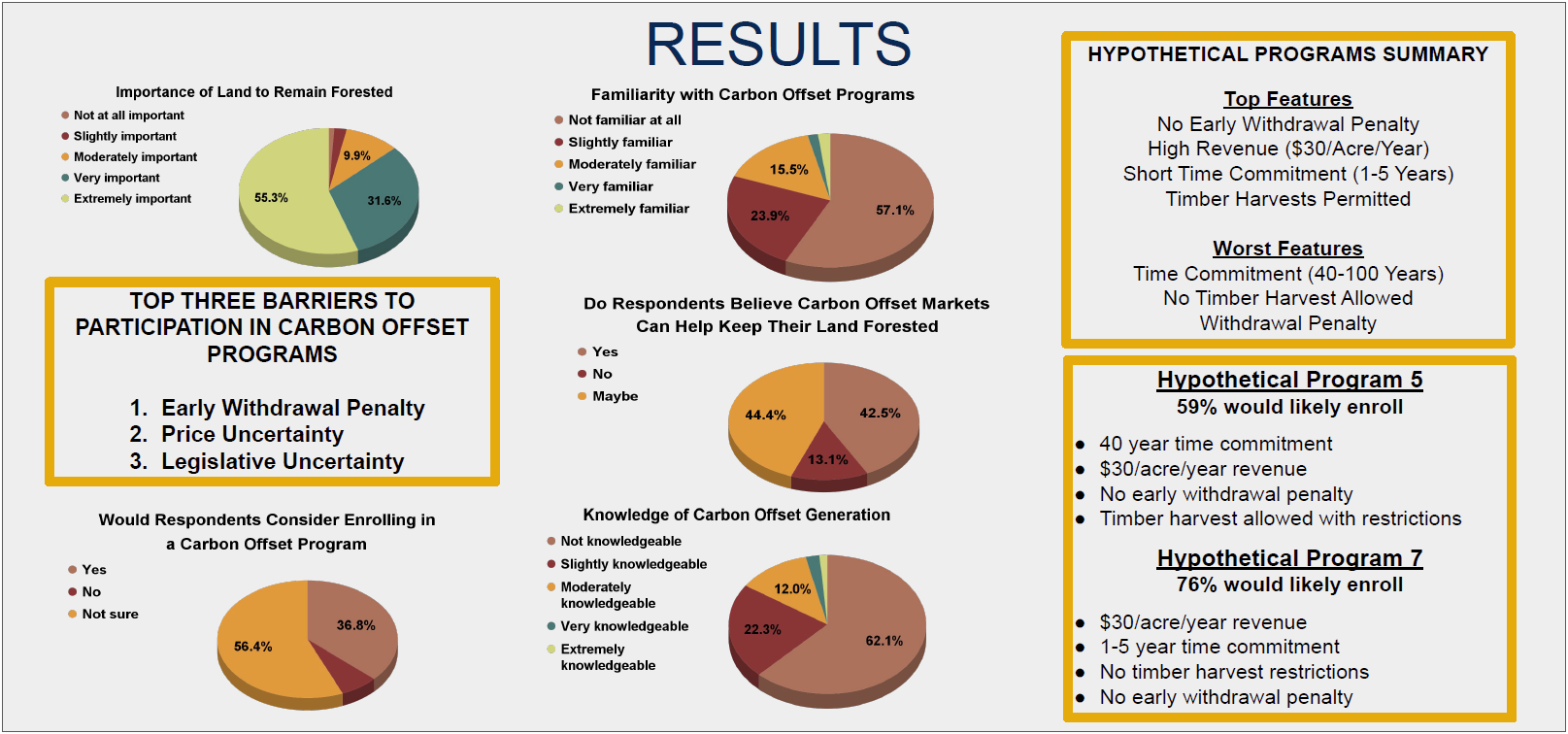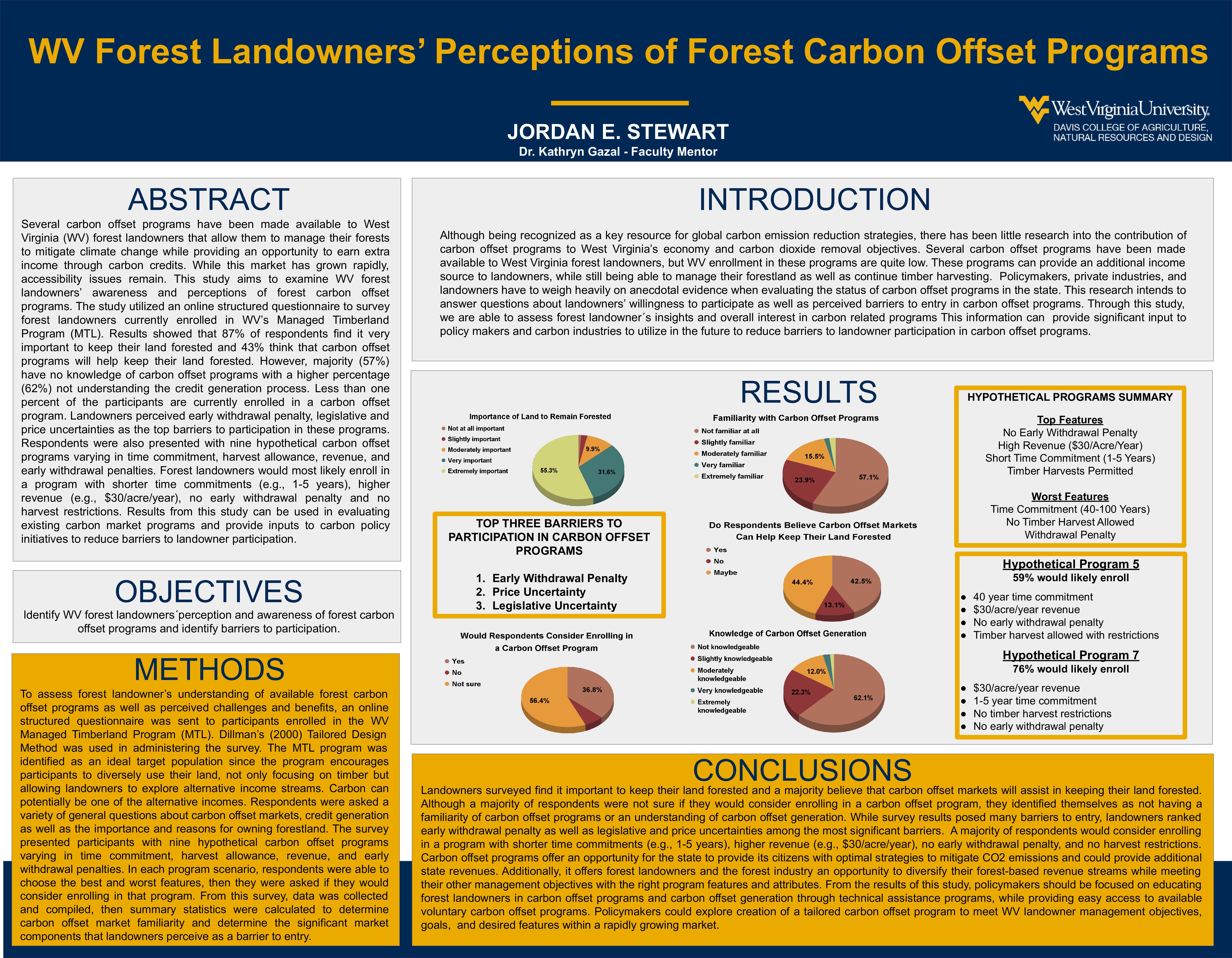A Poster Presentation from Jordan E. Stewart and Kathryn Gazal
West Virginia University, Davis College of Agriculture Natural Resources and Design
Abstract
Several carbon offset programs have been made available to West Virginia (WV) forest landowners that allow them to manage their forests to mitigate climate change while providing an opportunity to earn extra income through carbon credits. While this market has grown rapidly, accessibility issues remain. This study aims to examine WV forest landowners’ awareness and perceptions of forest carbon offset programs. The study utilized an online structured questionnaire to survey forest landowners currently enrolled in WV’s Managed Timberland Program (MTL). Results showed that 87% of respondents find it very important to keep their land forested and 43% think that carbon offset programs will help keep their land forested. However, majority (57%) have no knowledge of carbon offset programs with a higher percentage (62%) not understanding the credit generation process. Less than one percent of the participants are currently enrolled in a carbon offset program. Landowners perceived early withdrawal penalty, legislative and price uncertainties as the top barriers to participation in these programs. Respondents were also presented with nine hypothetical carbon offset programs varying in time commitment, harvest allowance, revenue, and early withdrawal penalties. Forest landowners would most likely enroll in a program with shorter time commitments (e.g., 1-5 years), higher revenue (e.g., $30/acre/year), no early withdrawal penalty and no harvest restrictions. Results from this study can be used in evaluating existing carbon market programs and provide inputs to carbon policy initiatives to reduce barriers to landowner participation.
Introduction
Although being recognized as a key resource for global carbon emission reduction strategies, there has been little research into the contribution of carbon offset programs to West Virginia’s economy and carbon dioxide removal objectives. Several carbon offset programs have been made available to West Virginia forest landowners, but WV enrollment in these programs are quite low. These programs can provide an additional income source to landowners, while still being able to manage their forestland as well as continue timber harvesting. Policymakers, private industries, and landowners have to weigh heavily on anecdotal evidence when evaluating the status of carbon offset programs in the state. This research intends to answer questions about landowners’ willingness to participate as well as perceived barriers to entry in carbon offset programs. Through this study, we are able to assess forest landowner´s insights and overall interest in carbon related programs This information can provide significant input to policy makers and carbon industries to utilize in the future to reduce barriers to landowner participation in carbon offset programs.
Objectives
Identify WV forest landowners’ perception and awareness of forest carbon offset programs and identify barriers to participation.
Methods
To assess forest landowner’s understanding of available forest carbon offset programs as well as perceived challenges and benefits, an online structured questionnaire was sent to participants enrolled in the WV Managed Timberland Program (MTL). Dillman’s (2000) Tailored Design Method was used in administering the survey. The MTL program was identified as an ideal target population since the program encourages participants to diversely use their land, not only focusing on timber but allowing landowners to explore alternative income streams. Carbon can potentially be one of the alternative incomes. Respondents were asked a variety of general questions about carbon offset markets, credit generation as well as the importance and reasons for owning forestland. The survey presented participants with nine hypothetical carbon offset programs varying in time commitment, harvest allowance, revenue, and early withdrawal penalties. In each program scenario, respondents were able to choose the best and worst features, then they were asked if they would consider enrolling in that program. From this survey, data was collected and compiled, then summary statistics were calculated to determine carbon offset market familiarity and determine the significant market components that landowners perceive as a barrier to entry.

Conclusions
Landowners surveyed find it important to keep their land forested and a majority believe that carbon offset markets will assist in keeping their land forested.
Although a majority of respondents were not sure if they would consider enrolling in a carbon offset program, they identified themselves as not having a familiarity of carbon offset programs or an understanding of carbon offset generation. While survey results posed many barriers to entry, landowners ranked early withdrawal penalty as well as legislative and price uncertainties among the most significant barriers. A majority of respondents would consider enrolling in a program with shorter time commitments (e.g., 1-5 years), higher revenue (e.g., $30/acre/year), no early withdrawal penalty, and no harvest restrictions. Carbon offset programs offer an opportunity for the state to provide its citizens with optimal strategies to mitigate CO2 emissions and could provide additional state revenues. Additionally, it offers forest landowners and the forest industry an opportunity to diversify their forest-based revenue streams while meeting their other management objectives with the right program features and attributes. From the results of this study, policymakers should be focused on educating forest landowners in carbon offset programs and carbon offset generation through technical assistance programs, while providing easy access to available voluntary carbon offset programs. Policymakers could explore creation of a tailored carbon offset program to meet WV landowner management objectives, goals, and desired features within a rapidly growing market.

